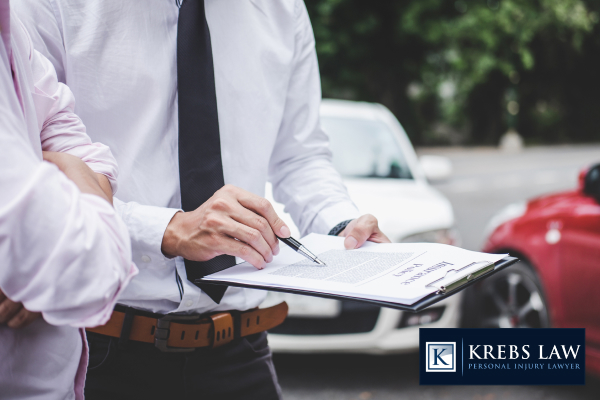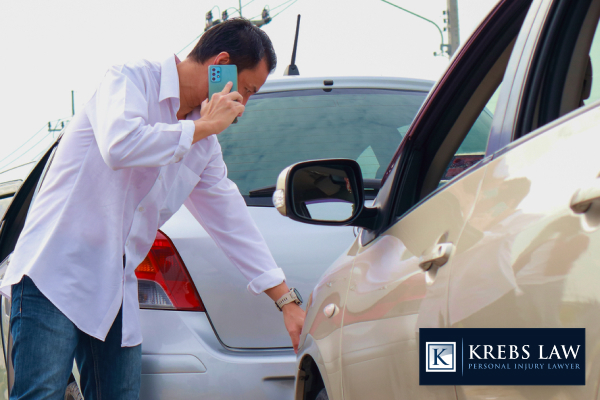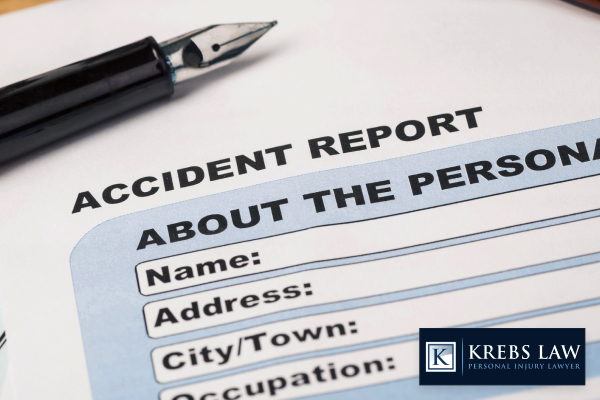This page was written, edited, reviewed & approved by JR Krebs following our comprehensive editorial guidelines. JR Krebs, the Founding Partner, has years of legal experience as a Personal Injury attorney. Our last modified date shows when this page was last reviewed.

Knowing how to claim auto insurance efficiently is important when you're in a car accident. It can help cover costs for damages and ensure you get back on the road sooner. The process may seem complex, but knowing the steps to file a claim can make it smoother.
At Krebs Law, we know that car insurance companies can be confusing. They might obfuscate, refuse to give you the actual cash value of your car, or try to control which repair shop you can use. Knowing your rights will allow you to take control of the situation after a car accident.
Learn more about filing an auto or liability claim below. Then, contact us to schedule a free case consultation.
An insurance claim is a detailed request to an insurance company for coverage or compensation for a loss.
It's how you ask your insurance provider to fulfill the promise of your auto insurance policy after a car or truck accident. This claim can help pay for repairs to your vehicle and other expenses related to the accident.
If you have rental reimbursement coverage, your insurance might even cover the cost of a rental car while your car is in the shop.
This process aims to return your financial situation to where it stood before the accident occurred. Filing a claim involves providing your insurance company with detailed information about the accident and the damage incurred.
Based on your policy details, the insurer will investigate your claim to determine how much money you're entitled to. Once approved, they will issue an insurance payment to cover the losses. It's essential to be aware of your policy well to know what's covered and what's not.

Filing an insurance claim helps you manage the financial burden after a car or motorcycle accident. Without a claim, you might have to pay out of pocket for repairs and other expenses, which can be considerably high.
An auto insurance claim also formalizes assessing damage and determining liability. It creates a record that can be useful for later disputes about the accident. Filing a claim is not just about receiving money; it's about leveraging the protection you've paid for under your auto insurance policy.
Additionally, your insurance agent can guide you through the claims process, ensuring you know each step and fulfill all requirements.
The details of the car crash determine whether you should file a claim with your insurance company or the other driver.
If you are at fault, you will probably need to submit a claim with your own insurance provider. However, you could submit a claim under their policy if the other driver is at fault.
It's important to know that filing with your company might be faster, as they already have your details and can process claims quickly.
In contrast, dealing with another driver's insurance company can sometimes be more challenging, as they might not be as motivated to settle your claim quickly or fairly.

After an accident, contact your insurance company as soon as you can to report the incident. Provide them with all the required details about the incident, including where and when it happened and the extent of the damages. This initial report sets the foundation for your claim.
The insurance agent will likely ask you several questions to understand the situation better. Be honest and as detailed as possible without speculating or guessing.
After this, the insurance company will begin processing your claim, which might involve sending out an insurance adjuster to assess the damage in person. They might also request additional documentation or evidence, such as police reports or witness statements.

Knowing the specifics of your auto insurance policy is key to knowing how much coverage you have in the event of an accident. Each policy has different terms and limits on what it covers and the amounts payable.
Knowing these details before an accident happens is important to ensuring your coverage meets your needs. Awareness of your policy helps prevent surprises during the claims process, as you'll already know what your insurance does and does not cover.
Your auto insurance policy comes with certain limits on how much it will pay for different types of claims. These limits are critical in determining how much financial aid you can get after an accident. You also have deductibles you pay out of pocket before your insurance kicks in.
Selecting a higher deductible can shrink your monthly premiums, but it means paying more upfront when you file a claim. Balancing these costs with what you can afford and your risk level is essential.

When you submit a car insurance claim, the insurer will send an adjuster to evaluate the damage. The adjuster's job is to assess how much the insurance company should pay for the repairs based on the policy's terms.
Dealing with adjusters can be tricky; they are trained to minimize the amount the insurance company has to pay. It's important to be well-prepared and to know your rights and what your insurance policy covers.
If your insurance claim gets denied, it doesn't mean it's the end of the road. You can challenge the decision. Review the reasons for denial that your insurance provider has provided first. This might involve checking if there was a misinterpretation of the policy or if all the facts were considered.
If you think the denial was wrong, you can submit an appeal with your insurer. This involves submitting additional documentation and evidence to support your claim. If this doesn't resolve the issue, legal action might be needed.
If you're facing challenges with a disputed car insurance claim, our Tuscaloosa car accident lawyer can help. We know the complexities of insurance policies and the tactics insurers use to deny claims.
Our team can review your case, advise on the best course of action, and represent you in negotiations with the insurance company. We can also take legal steps to ensure you receive the compensation you deserve. We aim to ensure you are treated fairly throughout the claims process.

If you've been in a car accident, you need the right legal support to ensure you receive fair compensation. At Krebs Law, our Tuscaloosa car accident lawyer specializes in helping victims of car accidents deal with the complex world of auto insurance claims.
We can help you understand your rights and take the needed steps to secure the compensation you deserve. Our team advocates for your rights and ensures you receive a fair settlement.
Contact us today to learn how we can help you with your car accident claim.

J.R. is dedicated to providing personalized representation, avoiding a one-size-fits-all approach. He tailors his strategy to the unique challenges and needs of each client and case, ensuring focused and individualized attention.
His practice mainly covers Plaintiff’s Personal Injury, including car and 18-wheeler accidents, slips and falls, dog bites, defective products, and wrongful death. He also handles commercial disputes on contingency, with experience in contracts, construction, and probate. For any dispute headed toward litigation, J.R. develops an aggressive strategy to maximize your recovery through negotiation, arbitration, or trial.


"*" indicates required fields

"*" indicates required fields